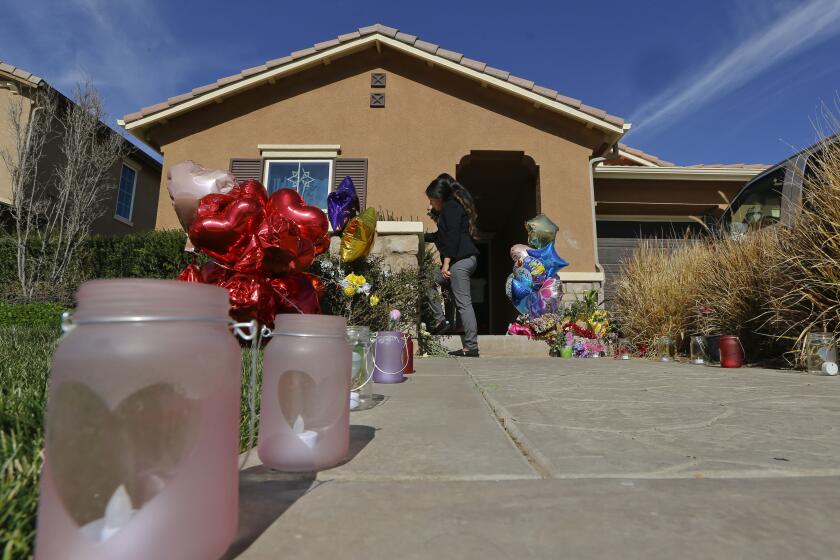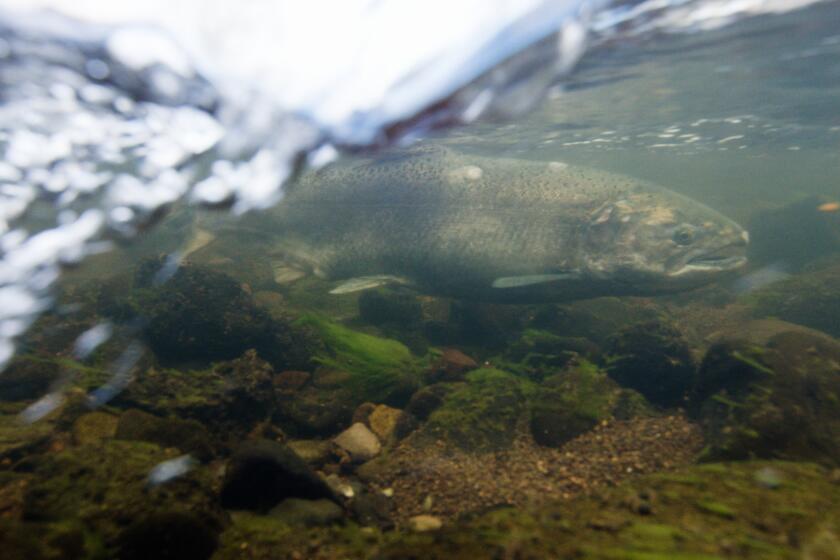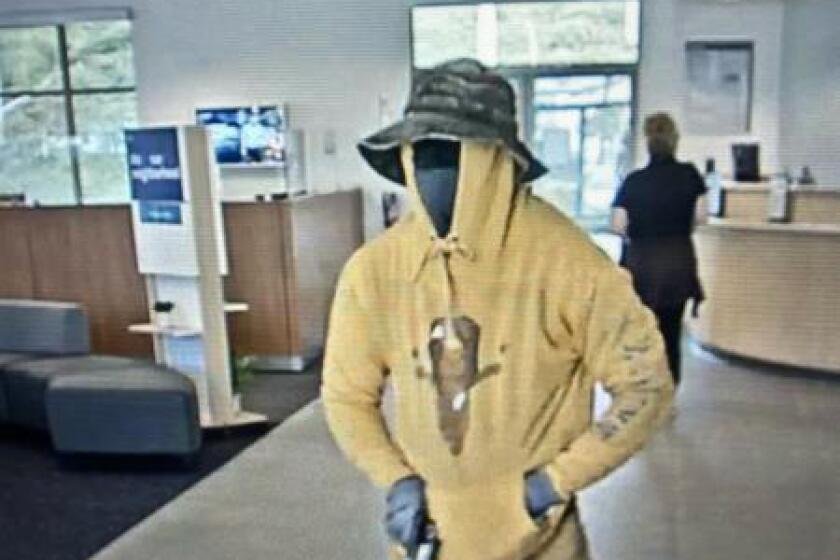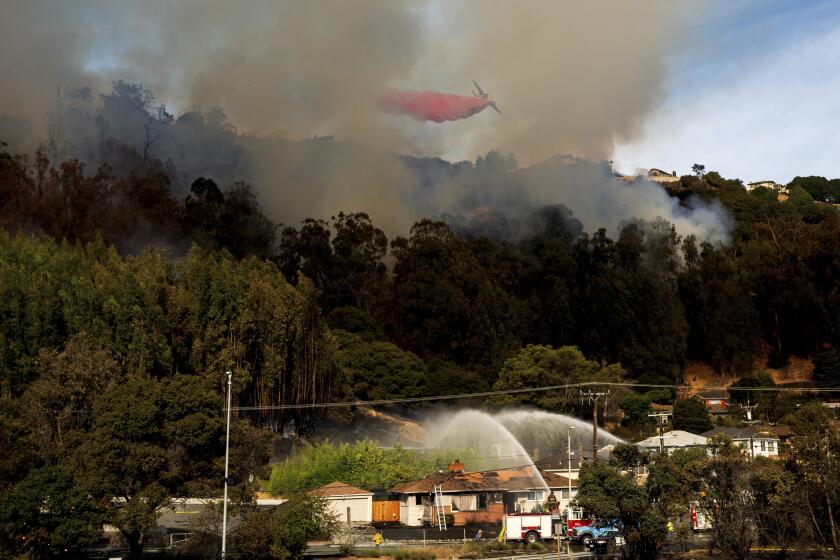New Cops on the Beat : Why, some might ask, would anyone want to become a police officer now? For 3 rookies, it’s the profession of pride.
It was one of the smallest classes in recent years--only 27 entered the Los Angeles Police Academy last September. Now, after 30 weeks of training, they’ve graduated and joined the Los Angeles Police Department as rookie officers. From the outset, it was a select group. The academy sees 3,500 applicants a year; perhaps two in a hundred qualify for acceptance.
This class included 20 men (six Anglo, four African-American, eight Latino, two Asian) and six women (five Anglo, one Asian). A seventh woman switched to the Fire Department in mid-course.
They ranged in age from 22 to 32. Fourteen had college degrees; nine more had one to three years of college. Twelve had served in the military.
Their academic average on standard California tests for peace officers was 92.1%. For overall achievement in academic work, physical performance, report writing, driving and shooting, their average was 89.3%.
But beyond the stats are individuals, with individual expectations in spite of their common purpose. The following three April graduates will be talking with the Los Angeles Times at periodic intervals during their first year on the force.
*
Even before he entered the Los Angeles Police Academy, David Schwacher had observed and admired “the professional attitude” of officers he met, their self-control and their ability to control any situation.
He wasn’t disappointed. The academy training emphasized “maintaining a level of professionalism, which means being respectful toward every individual,” he says. “That’s the key to being able to handle anything: having respect, interest and concern with what’s going on.”
Schwacher was, at 30, one of the older students. He was picked by the administration to be “class leader,” an official liaison between administrators and students.
He came late to this career choice. He grew up in Milwaukee, one of six children of a salesman and a secretary. He’d known no one in law enforcement. His brothers and sisters are in construction, personnel work, sign-language interpretation and vehicle maintenance for a utility company. In school, Schwacher played football, ran track and lifted weights. He had one semester at the University of Wisconsin-La Crosse, worked half a year as a stock person at a clothing store, even took a course in fire technology to see if that might interest him. Finally, in 1982, he joined the Marine Corps because he still “didn’t know what I wanted after high school.”
For 10 years he served in a number of positions, from infantryman to rifle platoon sergeant in the Gulf War. In the last few years, he became interested in law enforcement. He’d married a woman whose father was an investigator in the Navy’s criminal division, he took some night courses in law enforcement, and he “went on a few ride-alongs with the L.A. Sheriff’s Department.”
He was impressed--partly by the officers’ professionalism, partly by “the different duties and requirements. It was not a monotonous sort of work. Every call was different, from a robbery-assault involving a prostitute and her pimp, who’d taken her money, to a domestic violence call involving a mother and son.
“You had to find out what happened and basically take control of it, had to give these people appropriate information on how they could get help,” he says. “You had to be thinking constantly.”
When he came back from the Middle East in August, 1991, Schwacher took the LAPD and Sheriff’s Department tests, describing both as “geared to the ability to communicate.” The following fall he entered the academy and upon graduating was assigned to the Northeast Division near Dodger Stadium.
His immediate goal is “to make it through probation and get as much experience as possible. My training officer has 23 years on the force, which is real good because he has so much experience and knowledge, he’s got an answer for every situation.”
Among long-term goals, he’s thinking--given his interest in scuba diving--of “the LAPD dive team. I also have explosives experience, and there’s the bomb squad.
“But I’ve got no negative feelings about staying here in patrol,” he adds. “Patrol is the backbone of police work. It’s where all new officers start and where everything takes place--the immediate service needs of the community. The patrol officer is always the first responder, the first to evaluate a situation.”
Indeed, Schwacher’s training “stressed that you’re serving the community.” He believes the public welcomes this emphasis: “It’s like they like to have the police around. The bad comments that come out are from a small percentage of people. During the deployment the weekend of the (Rodney G. King beating civil rights trial verdicts), everyone was real supportive--everyone liked the visibility of the officers out there.”
*
To Schwacher’s classmate Pamela Pitcher, professionalism means “a combination of honesty, integrity and competence. It shows in your demeanor, your appearance, your attitude and concern for doing your job. You need to have confidence and control so everyone feels safe--you, your partner and the citizens involved.”
Pitcher, 24, was one of the younger members of the class. She was also class president, elected by her fellows to handle class gatherings and celebrations.
She knew nothing of police work growing up in Upland, the oldest of three girls. Her sisters are still in school; her mother is a homemaker, her father, a director of human resources for a bus company.
She was a good student, a cheerleader and a soccer player and went to Cal State Northridge to major in speech communication and public relations. When she thought of the future, she saw herself with a desk and an office and a corporate career in PR or advertising.
In mid-college, she married, and her husband, who had graduated earlier, became a police officer the same year. When Pitcher graduated in 1990, she took an ad agency job but stayed only six months.
“It wasn’t what I expected,” she says now. “I thought it would be interesting and exciting, that I’d feel more rewarded by it. But I wasn’t doing anything beneficial to anyone.
“I wanted something that could grow with me, so I made lists of what I wanted--something exciting, different all the time, something that involved physical activity, helping people, something I could be proud of doing. And the only career that kept coming up was law enforcement.”
The LAPD was appealing because “it was the largest department in the area and offered so many options--patrol, detective work, juvenile, canine, specialized task forces like SWAT, undercover assignments.”
She was also glad to be assigned to the Foothill Division. “I wanted to be close to my home, which meant the Valley,” she says. “But Valley divisions tend to be slow. This is the fastest and the largest, in terms of both the population and the square miles it covers.”
Already, her view of future options is changing. When she first applied to the academy, “they ask what you feel you have to offer the department. I talked about my public relations and communications skills, and I did think I might do something in communications. But now, actually, I’m drawn to patrol work, where you can be out there with the public.”
She sees the public attitude toward the police as mixed, not negative. “With any career,” she says, “there are people supportive and thankful for what you do, and people who don’t like you. I see just as much of the one as the other.”
Nor does she dwell on today’s climate of violence, believing that “if it’s my time to go, it’s my time to go. I also feel we were very well-trained in tactics, which covers how you handle various situations--traffic stops, searching a building for a burglar--though I’m aware you can’t be too complacent when you’re out there. You have to stay alert.”
Finally, she has confidence in her colleagues: “Everyone comes from different backgrounds, different job histories, attitudes and opinions. But when you come together, everyone’s the same, all are here to do the same job. When you’re a police officer, you’re ‘blue.’ It sums up the attitude: You always help and support the others.
“The same attitude has to stretch out to the community,” says Pitcher, “so you treat everyone the same there as well. Whether you’re dealing with somebody who’s homeless or a business executive, they all deserve the same quality of service.”
*
As a police officer, “you have to treat people with respect,” agrees Samuel Rhone, who has been assigned to the LAPD’s Southwest Division near Exposition Park. “When we have to inconvenience people, we have to let them know what’s going on. You don’t just do something and say, ‘We don’t have to explain anything to you.’ When people understand why you’re doing something, they can appreciate it.”
Rhone, 30, grew up in Compton. His mother, a single parent, was a seamstress. His brother, a former Navy man, is an electrician; his sister, a librarian. Rhone graduated from Cal State Dominguez Hills in business administration, planning to go into personnel management.
His interest in police work began there, when his classes included a number of police officers going to school at night. Moreover, he worked full time as a civilian employee in the LAPD’s supply department and stayed on after graduating from college in May, 1988.
All that time, he “was around the department. I knew how it worked, knew the chain of command, and I’d talked to officers a lot. They told me it was a good job, and every day is different.
“So I knew what I was getting into,” Rhone says. “But I wanted to be sure it was for me. I didn’t want just to jump into it, because if you don’t have the heart for police work, you really shouldn’t be there--not when you have so much authority, the ability to take someone’s freedom, to use force.”
Rhone found the academy “pretty much what I expected” until he injured his right knee and couldn’t manage the 3- to 4-mile runs. In November, he had arthroscopic surgery: “On a Monday, they gave me some crutches and told me to stay off it, but I went back Wednesday. I didn’t want to get bumped back to another class, so I continued to go--everything but the physical training, and I made that up later.”
His classmates were supportive, “often running the extra time with me,” he says. They also voted him the Tina Kerbrat Award--the academy equivalent of a spirit cup, named for an officer who was fatally shot in February, 1991, when she was only four months out of the academy.
Rhone found the law courses particularly interesting but still thinks the essence--and to him, the appeal--of police work is dealing with people, most of them “victims, because you get there after a situation has occurred and try to help them out.”
What’s more, he finds it rewarding. “I think the majority of the public think we’re great,” he says. “There’s a silent--no, a vocal--minority that makes it appear we’re disliked. I’ve only been out for a while, but I find people come up to us a lot just to say, ‘You guys are doing a good job; be careful out there.’ ”
He acknowledges that there have been problems: “Because of the Rodney King case or those two guys who were in jail 17 years for something they didn’t do, because of the reports of brutality and the civil awards the city has had to pay out, a lot of people have been saying, ‘What’s going on with the police?’ But everyone wants the same thing: They want to go to work, to be able to go home, be with their family and be safe.”
Each officer contributes to the general image, says Rhone, and should “never let (their) emotions dictate the situation. If a person is uncooperative, even offensive, you maintain a professional attitude. Getting upset won’t help, and all eyes are focused on you.”
Some will always hold negative views, Rhone concedes. But when he hears such negatives from kids, “I tell them if you don’t like a situation, you have to become part of it in order to change it. When they complain about police treatment, I encourage them to go into police work, and I say, ‘When you get out there, you treat people different.’ ”
More to Read
Sign up for Essential California
The most important California stories and recommendations in your inbox every morning.
You may occasionally receive promotional content from the Los Angeles Times.










